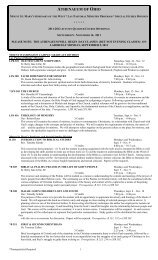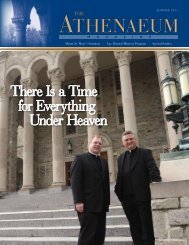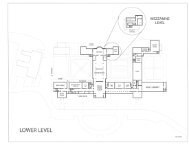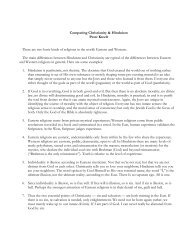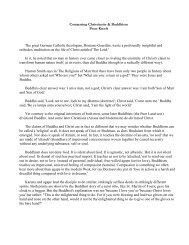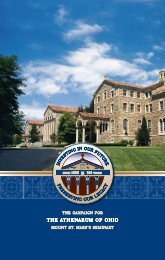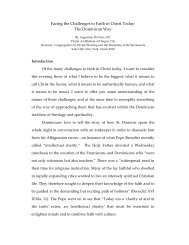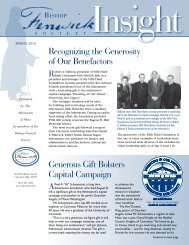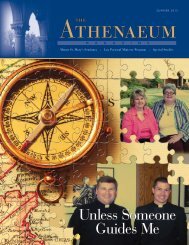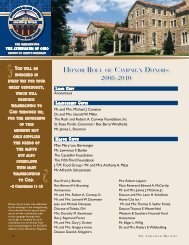Notes from Gathered for the Journey Six (6) essays David McCarthy
Notes from Gathered for the Journey Six (6) essays David McCarthy
Notes from Gathered for the Journey Six (6) essays David McCarthy
Create successful ePaper yourself
Turn your PDF publications into a flip-book with our unique Google optimized e-Paper software.
Love directs <strong>the</strong> talents and <strong>the</strong>ir development outward—to <strong>the</strong> glory of God and<strong>the</strong> well-being of o<strong>the</strong>rs in charity.(5) NOTE: Miller rephrases <strong>the</strong> problem of The Natural-―he does not love doing what heis created to do.‖ (194)One cannot be narrow and self-serving—what is <strong>the</strong> effect on o<strong>the</strong>rs, <strong>the</strong> world?To learn to ―love <strong>the</strong> game‖ opens <strong>the</strong> way to developing one‘s natural talents—beyond oneself—to <strong>the</strong> good of <strong>the</strong> o<strong>the</strong>r—seeing <strong>the</strong> acts of <strong>the</strong> ―game‖—life—as beautiful in <strong>the</strong>mselves ra<strong>the</strong>r than as self-directed means to my ends. (love ofvirtue—<strong>the</strong> good—<strong>for</strong> itself)The Impact of Sin—moving beyond <strong>the</strong> Analogy (195, bottom)We do not earn giftsGifts vary <strong>from</strong> person to personAll gifts are capacities to help—―to contribute to our human community and share<strong>the</strong> good of human life.‖ (195)Selfishness and Sin, however, limit our ―own freedom and fulfillment.‖KEY—―We are liable to narrow what we are able to see as freedom and <strong>the</strong>human good Such sin as narrow vision leads us to harm and do evil to o<strong>the</strong>rs in<strong>the</strong> name of our good.‖ (195)Garden of Eden—<strong>the</strong> narrowing of Adam and Eve‘s vision—<strong>the</strong> making <strong>the</strong>ir ―own‖what is a gift—grace—<strong>from</strong> Almighty God. Putting aside God‘s will <strong>for</strong> <strong>the</strong>ir au<strong>the</strong>ntichappiness in union with Him, <strong>the</strong>y settle <strong>for</strong> turning inward—self-centered, <strong>the</strong> center of<strong>the</strong> moral universe (modern blind autonomy). [―…you will be like God..‖—<strong>the</strong>primordial lie]CONCLUSIONMiller recaps <strong>the</strong> <strong>the</strong>ological virtues and <strong>the</strong>ir definition—or descriptionMiller repeats his point that <strong>the</strong> <strong>the</strong>ological virtues are not external (―on top‖), buta trans<strong>for</strong>mation of our very nature, our inner capacity of freedom. Miller opens<strong>the</strong> door to <strong>the</strong> next essay by Mattison on specific virtues—a habitus shaping ourfreedom.Miller closes refuting <strong>the</strong> ―straw man‖ argument against religion as robbing oneof freedom and inciting murderous actions by rightly observing: ―I have shownthat God‘s power is <strong>the</strong> source of our freedom to act toward and be fulfilled inwhat is good <strong>for</strong> us. Insofar, as faith is used to oppress o<strong>the</strong>r and to underminehuman dignity, it is disordered faith—not ordered by <strong>the</strong> grace that make fulfilledand free.‖ (emphasis added,197)Fundamental Moral Theology Page 34 of 54Class <strong>Notes</strong> – Fa<strong>the</strong>r Michael Seger



